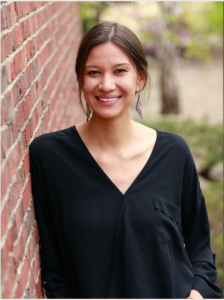By Christa Rodriguez || Campus Life Editor

Natives in America is an online literary publication which displays the research, prose, and poetry of young Native Americans, Alaskan Natives, and Native Hawaiians. The founder of this publication, Megan Red Shirt-Shaw, spoke at this past Thursday’s Common Hour. She is an enrolled member of the Oglala Sioux tribe, and opened the Common Hour by speaking in Lakota, the first language of her mother.
Red Shirt-Shaw earned a bachelor’s degree in English from the University of Pennsylvania, and her Masters degree in Higher Education from the Harvard Graduate School of Education.
Currently working on her doctorate at the University of Minnesota in Higher Education, she is passionate about the success of Native students in academia.
Red Shirt-Shaw posed three questions for the audience to ponder: Who’s traditional homeland is Franklin & Marshall’s campus located on? Can you name five Native nations in the U.S.? What does the U.S. Constitution say about Native peoples?
In answer to the questions, she revealed that the F&M campus is on the land of the Haudenosaunee Confederacy, and that there are actually 572 sovereign Native Nations within our borders. Instead of telling the audience about all of these Nations, she said, “You have to do the work yourselves,” calling out the education system for glossing over the existence of these Nations. As Red Shirt-Shaw is part of the Oglala Lakota Nation, she recognized that her experience as a Native American is much different than a Native American from another Nation. She notes that Americans call themselves “a nation of immigrants,” yet this erases the identities of Native peoples.
The answer to the third question was that the Constitution refers to Native peoples as “merciless indigenous savages.” In this country, Natives still experience voter suppression and other forms of oppression. To Red Shirt-Shaw, the founders did not create this nation with the Natives in mind. “They tried to bury us,” she said.
She stated that we are not owning up to our injustices as a nation. No matter what party you identify with, “everyone has work to do.” She said that her intention is not to make the audience feel responsible for the past, but rather know that we are responsible for understanding others’ experiences.
Additionally, she spoke on the issue of Native people enrolling in educational spaces that do not acknowledge their existence. Attending these spaces, to her, was an “act of resilience and resistance,” as her and other Native peoples often have to explain their identity to others. She told minority students, “You are paving the path, so dream big.”
She relayed her experiences at UPenn, noting that during her time there she was one of only five Native students. With such a lack of Native representation in the student body, she stated that if no one ever took over their narrative, it would never be told. Their small five-person group planned events, wrote a land acknowledgement into the school’s constitution, and had the support to find a home “on a campus not created for [them].”
Now, she wants to be that support for the younger generations by building them up and engaging them in difficult dialogue.
For the online publication Natives in America, she wants the writing about indigenous culture to be “empowered in the collective.” Her goal is to eventually have this publication on every college campus.
She encouraged the audience to go online and read Natives in America to educate themselves. “We will never be buried, we will never be quiet,” she said. “We’re not going anywhere.”
Senior Christa Rodriguez is the Campus Life Editor. Her email is crodrigu@fandm.edu.